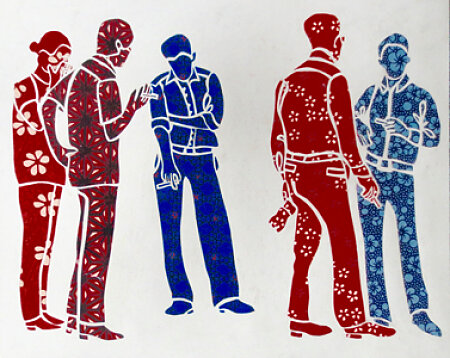
Moscow Cockroaches
It's summer 1988. My friends Sergey and Dmitry and I are in Moscow for the film festival. Midnight is just around the corner. We arrived from Leningrad this morning but failed to consider a place to stay in the USSR's capital.
Hotels are neither common nor affordable in the Soviet Union—not something one considers or has any experience with. We imagined we’d rent a room to sleep in for a couple of days—but how? We consider sleeping in a park, but where are the parks in this city? We could be arrested, charged, expelled from college. I’m just done with two years in the Soviet military, where any notion of initiative is anathema. I’m twenty, but I’ve had little time on my own, out in the world.
We ask a stranger on the subway, then another. Someone recommends Moscow State’s dorm. With most students gone for the summer break, it’s bound to have empty rooms.
A reasonable plan. We get off at a subway station on the outskirts of Moscow and ask for directions to the campus. Six or seven twelve-story buildings, drab and gray, hover together in a clump suggesting a common purpose. The lobby in one of them is lit. We enter through the heavy glass doors.
Two middle-aged guards sit at a small table by the entrance, their inquisitive eyes on us.
“Hello,” Dmitry opens. “We’re here in Moscow for three days. We’re not sure where to stay. Someone recommended this place.”
“This place? What do you mean? This is for the students.” The man makes a broad gesture with his arms, as if to give his assertion extra physical presence.
“Aren’t most students back home for the summer?” I say.
“Yes, but it doesn’t mean people can just stay here.”
“We can pay rent,” Sergey offers.
The contempt on the security man’s face is replaced by a degree of interest. He probably makes 150 roubles a month and desperately needs to supplement it. His companion looks at him inquisitively. The chances of trouble are minimal. It’s not like the KGB will storm the campus at night to check for unlawful travelers.
“Lyesha, let them in.” The second man’s voice is strangely high-pitched. “Why not? They sound like reasonable kids. And we could get another half-liter.”
I notice two glasses with the remains of a transparent liquid.
“OK, twenty roubles.” His boss avoids eye contact.
We hand over the cash, and Lyesha’s colleague escorts us to the elevator. Russians are romantics who love poetry and bribes.
“Go to floor nine. No, go to ten. You can take any empty room there.”
“Thank you.” I’m still incredulous at our easy success.
“Make sure the room is unoccupied, you hear me?”
Amid the dread of the communist regime, this experience allows a glimpse at the cooperation of strangers. We distrust the state more than we can ever distrust an individual.
